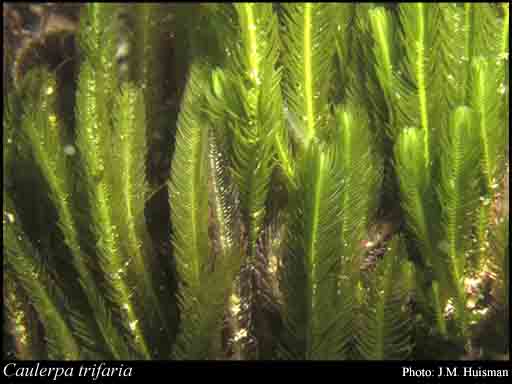- Reference
- Phycol.Austral. pl. CCLXI (1863)
- Conservation Code
- Not threatened
- Naturalised Status
- Native to Western Australia
- Name Status
- Current

Scientific Description
Habit and structure. Stolon usually moderately slender, 0.7–1.5 mm in diameter, bearing scattered, short spines about 0.5 mm long, epilithic, on jetty piles or in sandy mud substrate. Erect fronds medium green, with simple or occasionally branched axes, usually 5–25 cm high and 4–12 mm across; axes terete, 400–600(–700) µm in diameter, with short spinous ramuli near their base, above bearing 3 (2 when juvenile or rarely on mature fronds) regular rows of slender, terete ramuli. Ramuli separated by less than their basal width, 3–5(–9) mm long and 200–300 µm in diameter, terete, with a slight to moderate upward curve, tapering close to their apices to a short spinous tip.
Distribution. From Cottesloe, W. Aust., to Western Port, Vic., and around Tas.
Habitat. Usually confined to moderately sheltered to calm water, 2–31 m deep.
[After Womersley, Mar. Benthic Fl. Southern Australia I: 264 (1984)]
Distribution
- IBRA Regions
- Esperance Plains, Swan Coastal Plain.
- IBRA Subregions
- Perth, Recherche.
- IMCRA Regions
- Central West Coast, Leeuwin-Naturaliste.
- Local Government Areas (LGAs)
- Cottesloe, Esperance, Joondalup, Rockingham.